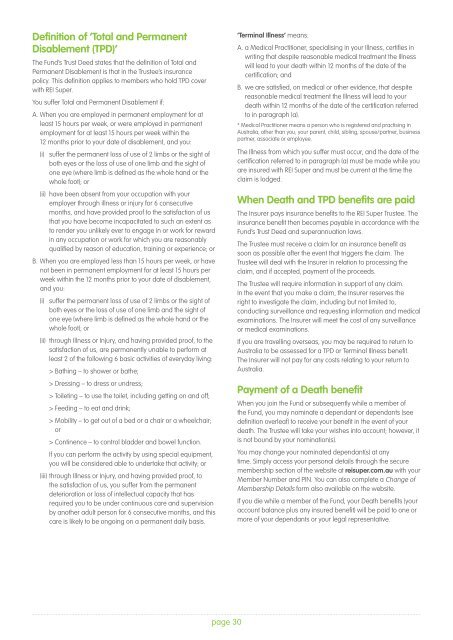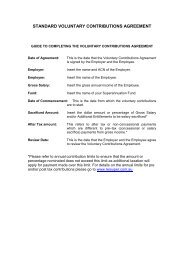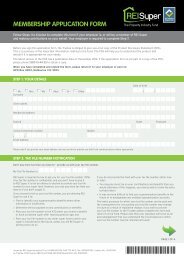Member Information Booklet - REI Super
Member Information Booklet - REI Super
Member Information Booklet - REI Super
You also want an ePaper? Increase the reach of your titles
YUMPU automatically turns print PDFs into web optimized ePapers that Google loves.
definition of ‘total and Permanent<br />
disablement (tPd)’<br />
The Fund’s Trust Deed states that the definition of Total and<br />
Permanent Disablement is that in the Trustee’s insurance<br />
policy. This definition applies to members who hold TPD cover<br />
with <strong>REI</strong> <strong>Super</strong>.<br />
You suffer Total and Permanent Disablement if:<br />
A. When you are employed in permanent employment for at<br />
least 15 hours per week, or were employed in permanent<br />
employment for at least 15 hours per week within the<br />
12 months prior to your date of disablement, and you:<br />
(i) suffer the permanent loss of use of 2 limbs or the sight of<br />
both eyes or the loss of use of one limb and the sight of<br />
one eye (where limb is defined as the whole hand or the<br />
whole foot); or<br />
(ii) have been absent from your occupation with your<br />
employer through illness or injury for 6 consecutive<br />
months, and have provided proof to the satisfaction of us<br />
that you have become incapacitated to such an extent as<br />
to render you unlikely ever to engage in or work for reward<br />
in any occupation or work for which you are reasonably<br />
qualified by reason of education, training or experience; or<br />
B. When you are employed less than 15 hours per week, or have<br />
not been in permanent employment for at least 15 hours per<br />
week within the 12 months prior to your date of disablement,<br />
and you:<br />
(i) suffer the permanent loss of use of 2 limbs or the sight of<br />
both eyes or the loss of use of one limb and the sight of<br />
one eye (where limb is defined as the whole hand or the<br />
whole foot); or<br />
(ii) through Illness or Injury, and having provided proof, to the<br />
satisfaction of us, are permanently unable to perform at<br />
least 2 of the following 6 basic activities of everyday living:<br />
> Bathing – to shower or bathe;<br />
> Dressing – to dress or undress;<br />
> Toileting – to use the toilet, including getting on and off;<br />
> Feeding – to eat and drink;<br />
> Mobility – to get out of a bed or a chair or a wheelchair;<br />
or<br />
> Continence – to control bladder and bowel function.<br />
If you can perform the activity by using special equipment,<br />
you will be considered able to undertake that activity; or<br />
(iii) through Illness or Injury, and having provided proof, to<br />
the satisfaction of us, you suffer from the permanent<br />
deterioration or loss of intellectual capacity that has<br />
required you to be under continuous care and supervision<br />
by another adult person for 6 consecutive months, and this<br />
care is likely to be ongoing on a permanent daily basis.<br />
page 30<br />
‘terminal illness’ means:<br />
A. a Medical Practitioner, specialising in your Illness, certifies in<br />
writing that despite reasonable medical treatment the Illness<br />
will lead to your death within 12 months of the date of the<br />
certification; and<br />
B. we are satisfied, on medical or other evidence, that despite<br />
reasonable medical treatment the Illness will lead to your<br />
death within 12 months of the date of the certification referred<br />
to in paragraph (a).<br />
* Medical Practitioner means a person who is registered and practising in<br />
Australia, other than you, your parent, child, sibling, spouse/partner, business<br />
partner, associate or employee.<br />
The Illness from which you suffer must occur, and the date of the<br />
certification referred to in paragraph (a) must be made while you<br />
are insured with <strong>REI</strong> <strong>Super</strong> and must be current at the time the<br />
claim is lodged.<br />
when death and tPd benefits are paid<br />
The Insurer pays insurance benefits to the <strong>REI</strong> <strong>Super</strong> Trustee. The<br />
insurance benefit then becomes payable in accordance with the<br />
Fund’s Trust Deed and superannuation laws.<br />
The Trustee must receive a claim for an insurance benefit as<br />
soon as possible after the event that triggers the claim. The<br />
Trustee will deal with the Insurer in relation to processing the<br />
claim, and if accepted, payment of the proceeds.<br />
The Trustee will require information in support of any claim.<br />
In the event that you make a claim, the Insurer reserves the<br />
right to investigate the claim, including but not limited to,<br />
conducting surveillance and requesting information and medical<br />
examinations. The Insurer will meet the cost of any surveillance<br />
or medical examinations.<br />
If you are travelling overseas, you may be required to return to<br />
Australia to be assessed for a TPD or Terminal Illness benefit.<br />
The Insurer will not pay for any costs relating to your return to<br />
Australia.<br />
Payment of a death benefit<br />
When you join the Fund or subsequently while a member of<br />
the Fund, you may nominate a dependant or dependants (see<br />
definition overleaf) to receive your benefit in the event of your<br />
death. The Trustee will take your wishes into account; however, it<br />
is not bound by your nomination(s).<br />
You may change your nominated dependant(s) at any<br />
time. Simply access your personal details through the secure<br />
membership section of the website at reisuper.com.au with your<br />
<strong>Member</strong> Number and PIN. You can also complete a Change of<br />
<strong>Member</strong>ship Details form also available on the website.<br />
If you die while a member of the Fund, your Death benefits (your<br />
account balance plus any insured benefit) will be paid to one or<br />
more of your dependants or your legal representative.





